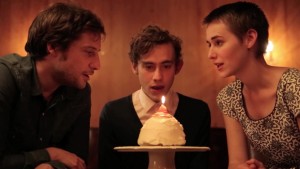 Review: One Screening Only
Review: One Screening Only
Funny Bunny | Alison Bagnall | USA | 2015 | 85 minutes
Micro-Wave Cinema Series, 4070 Vilas Hall, Sunday, December 8, 7:00pm»
James Kreul argues that a bro-mance between two infantile men who meet a manic pixie dream girl cannot be great cinema in 2015. But Funny Bunny is good, well crafted, entertaining American independent cinema, and that’s all we should ask it to be.
Funny Bunny is good. Not great. But good. There are many reasons to see it, and many reasons to support this kind of filmmaking, as outlined in a recent interview with producer Laura Heberton. Skilled actors are guided by an observant director, and photographed by a talented cinematographer. The film is not burdened by grand ambitions, and its tale is efficiently told in a manageable 85 minutes. Ultimately, it showcases much of the strongest qualities of low-budget American independent filmmaking in 2015. But it also exemplifies why it is often hard to get excited about American independent filmmaking these days.
A bro-mance between two seemingly infantile men who want to meet an on-line manic pixie dream girl cannot be great cinema in 2015, nor can it inspire great cinema. It can be good cinema, and perhaps that’s all that we should ask it to be.
Indie-everywhere man Kentucker Audley (who also appears in the 2015 Independent Spirit Cassavetes award nominee Christmas, Again, among others) stars as Gene, an advocate against childhood obesity whom we meet while he canvases a suburban neighborhood. When Gene knocks on the door of a much larger opulent home, he meets a young man awkwardly named Titty (Olly Alexander), who seems to be a young man-child left to his own devices (and trust fund). Titty has little interest in Gene’s political mission, and invites Gene to a sleep-over.
Gene has his own issues with arrested development. Gene’s ex-wife wants him to leave their house, and Gene curls up on the couch and protests like a petulant child. With nowhere to go, Gene decides to accept Titty’s invitation. Gene soon discovers Titty’s obsession with an online webcaster, Ginger (Joslyn Jensen), to whom Titty quickly pledges money with his credit card when she makes an appeal to help her pet bunny. As an only slightly more mature mentor, Gene persuades Titty to go an meet Ginger in real life.
As with many screenplays (or working scenarios, I’m unclear about the nature of the collaboration between director Alison Bagnall and the lead actors, all of whom get writing credits) with relatively passive protagonists, Funny Bunny has some structural issues with its dramatic conflicts. Once Ginger initially rejects Gene and Titty, narrative momentum is stuck because neither of them serves as an active protagonist who can do anything about it. Instead, Ginger has to arbitrarily change her mind about them and invite them to participate in an activist group against animal cruelty. The activist group provides quasi-plot points 30 minutes in and 30 minutes for the end, but it never seems more than a contrived distraction from the three central characters, who don’t pursue their own goals.
I hate to use the word “twee,” because once I start doing so I usually can’t stop. But Funny Bunny is an outright twee-fest, and your response to the film rests largely with your twee-tolerance. It’s possibly the most twee film I’ve seen since God Help the Girl, which also features Alexander, a talented performer who unfortunately suffers from resting twee-face. Audler, whose persona is more like a jock, has to do much more work to get to twee, including a schoolboy’s jacket from the 1980s. Jensen summons her best Miranda July for both of Ginger’s personas, on and off line. Ginger’s problems with physical intimacy might be the most severe of the three lead characters, but the flippant way the film addresses that issue is also the film’s most twee moment. But now I’m dangerously close for blaming the actors for the material, because I’m not particularly twee-tolerant.
On a scene-by-scene level, however, Funny Bunny is often amusing and charming, and that’s probably the best way to evaluate the film and appreciate its merits. Despite my issues with the material and its overall maturity, all three actors are exceedingly charismatic and easy to watch. It’s easy to understand why the film as done well on the festival circuit. The scenes have an effortless rhythm to them, and only seem forced when the dramatic situations are contrived, like when Gene tries to convince a bike-shop employee (the great Josephene Decker, in a thankless role here) to show Titty her breasts. Bagnall and her crew (especially cinematographer Ashley Connor) are talented filmmakers, and know how to make the material maximally engaging.
Andrew Sarris once compared the peaks and valleys of Hollywood filmmaking vs. European filmmaking. The Europeans might beat Hollywood at the peaks, Sarris suggested, but Hollywood would always dominate in the middle ground, the well made average film. It would be interesting to do a similar analysis of contemporary middle ground Hollywood vs. middle ground and even low-budget American indies. Films like Funny Bunny could make a case for the well made low-budget indie.